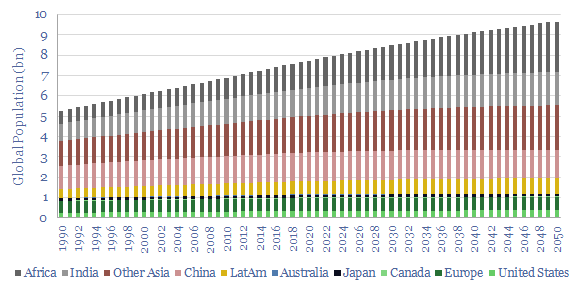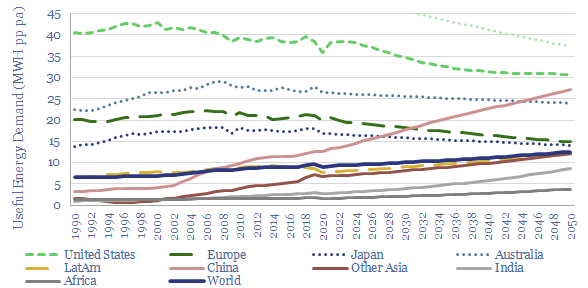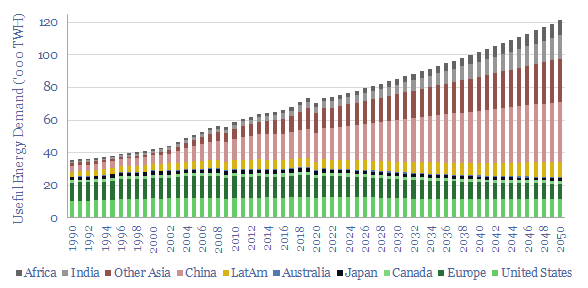This model captures global energy demand by region through 2050, rising from 70,000 TWH in 2019-22 to 120,000 MWH in 2050. Population rises 1% pa. Energy use per global person rises at 1% pa, from 9.3 MWH pp pa to 12.6 MWH pp pa. So total demand rises c2% pa. Meeting the energy needs of human civilization is crucial in the energy transition.
Total global energy consumed by human civilization has averaged 70,000 TWH over the past five years, from 2018-2022, on a useful energy basis. This comprises an average of 9.3 MWH pp pa of useful energy across 7.7bn people.
Global energy demand growth averaged 2.6% per annum from 1990 to 2019, of which 1.3% per annum is due to population growth and 1.2% per annum is due to rising energy consumption per capita.
Our outlook through 2050 is that total global energy consumption will surpass 120,000 TWH, on a useful energy basis. This represents a 1.6% growth rate.
0.8% is from population growth, as the World Bank sees global population reaching 9.7bn people by 2050. An interesting nuance in the population forecasts is that the growth rate slows over time, from 0.9% pa in the next decade to 0.6% pa in the 2040s. In turn, this suggests energy demand growth through 2050 will be somewhat front loaded.

0.9% is from rising useful energy demand per person. But these are not aggressive numbers. Small tweaks in our model of global energy demand by region and through 2050 can yield another 10-30% upside again.
Inequalities and catch-ups are a tension in the model. Today, useful energy consumption runs at 20MWH pp pa in Europe and Japan, and as much as 40 MWH pp pa in North America. Conversely, the poorest 4bn people in the world, especially in Africa, India and other Asia, consume an average of 2.5 MWH pp pa today (more here). Even by 2050, this group is only seen consuming 6 MWH pp pa of useful energy, which is 60-80% below Western levels. This sits uncomfortably with other goals for human development.

Electrification is another theme in the data-file. Total useful electricity consumption has averaged 27,500 TWH pa over the past half-decade, equivalent to 3.6 MWH of useful energy per global person, or 38% of all useful energy consumption. In other words, 62% of useful energy has been consumed directly as heating fuel or in combustion engines.
We see the growth rate of electrification doubling, from 2% pa in the past decade to 4% pa in the next decade, as part of the energy transition. Thus by 2050, we think that electricity will comprise 60% of total useful energy consumption (please see our power grids research). Our recent research explores $2trn of medium-term upside for capital goods companies as a result of electrification in the energy transition.
What share for wind and solar? Our forecasts for wind and solar step up to provide 34,000 TWH of useful energy by 2050 (note here). This would be 25% of total global energy demand. We also see nuclear re-accelerating and growing more than 2.5x. The remaining c65% will need to be sourced from somewhere, and we think the best candidate is low-carbon natural gas, combined with CCS and CO2 removals.
Different regions are represented in the data-file. China is worth a passing mention: energy demand per capita is apt to look higher than it is, because a remarkable 60-65% of all China’s energy is used for heavy industry and manufacturing, creating products that are ultimately exported and consumed elsewhere. Assumptions and growth-rates for different regions can be stress-tested in the data-file to run your own scenarios.
